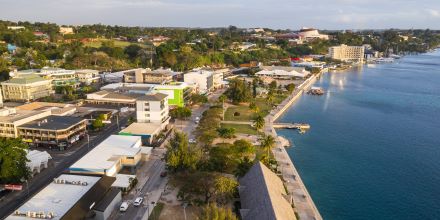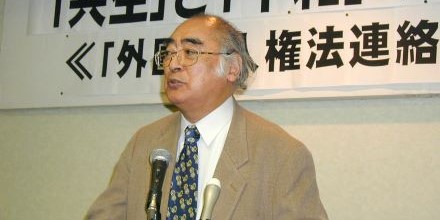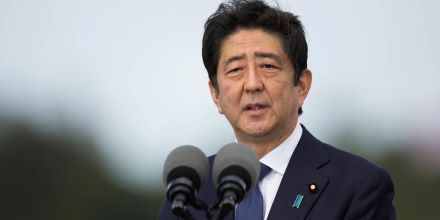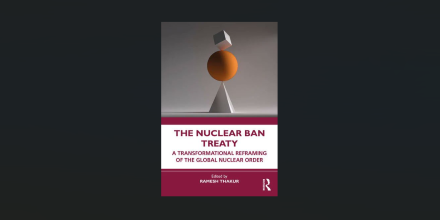Vanuatu's Bid for Climate Justice at the ICJ
Sep 2022 - News
Two recent reports from ABC Pacific update Vanuatu's bid to take climate justice to the International Court of Justice. Vanuatu closes in on push to take climate justice to international court Vanuatu says it has the support of a majority of UN General Assembly members to take climate justice to International Court of Justice. Listen to the full report. Vanuatu claims overwhelming support for United Nations climate justice bid Vanuatu says it has the numbers at the United Nations General Assembly to get climate justice in front of the world's highest court. The Pacific nation has been leading a campaign to get the International Court of Justice to issue an opinion on the right to be protected from climate change. If a majority of the UN General Assembly's 97 states to vote in favour of the resolution, the body would then refer the matter to the ICJ. Listen to the full report. Image: Asia Travel/Shutterstock
President Ikeda’s Statement Urges No First Use Policy
Jul 2022 - News
On July 26, 2022, Toda Peace Institute's Founder, Daisaku Ikeda, issued a statement to the 2022 NPT Review Conference calling for “No First Use” of nuclear weapons. In the statement, he strongly calls on all states parties to seize the opportunity of this NPT Review Conference to include in the Final Document commitments to a policy of No First Use by the nuclear-weapon states, support for this principle by all states parties and the extending of negative security assurances to all non-nuclear-weapon states, thereby promoting the transition to a new security paradigm. Seventy-seven years have passed since the atomic bombings of Hiroshima and Nagasaki, and not only has there been a lack of any concrete progress toward nuclear weapons abolition but the risk that nuclear weapons will actually be used has risen to the highest level since the end of the Cold War. President Ikeda states that nuclear weapons must never be used, and it is imperative that effective measures be taken to prevent this dire eventuality. Please find the full statement from SGI President Daisaku Ikeda here. Image: Romolo Tavani/ Shutterstock
Obituary: Kinhide Mushakoji
Jul 2022 - News
Professor Kinhide Mushakoji, 1929-2022 It is with great sorrow that the Toda Peace Institute has learned of the death of Prof. Kinhide Mushakoji. He was a long-time supporter of the work of the Toda Peace Institute and a close friend of mine. Professor Mushakoji was born in Brussels, Belgium, in 1929 and passed away on 23 May 2022 at the age of 92. He had a long and distinguished academic career focusing on international relations and peace research. In fact, he was a peace researcher long before peace research became a recognised academic discipline. He was never content to be an armchair academic, however, and devoted his life to the promotion of nonviolence, peaceful solutions to violent conflict and an end to militarism everywhere. He was a tireless advocate for strengthening the United Nations and the promotion of human rights, multi-culturalism and tolerance in Japan and around the world. Professor Mushakoji was a graduate of the Political Science Department of Gakushuin University (Tokyo), and the Institut des Sciences Politiques, at the University of Paris. He had a distinguished academic career at Gakushuin University and, from 1968 to 1976, he was a Professor at Sophia University (Tokyo), where he was also Director of the university’s Institute of International Relations which he founded in 1969. He was Vice Rector of the United Nations University for 13 years and on retirement was a Professor at Meiji-Gakuin University (1989–1998), Ferris University Japan (1998‒2000), and Chubu University (2001–2004). From 2013 until his retirement, he was Professor by special appointment with the Osaka University of Economics and Law. I first met Professor Mushakoji in Tashkent at a workshop on nuclear disarmament organised by the United Nations University and the Soviet Academy of Sciences. Although he was from an aristocratic family, he was never elitist in his relations with others. On the contrary, he had a most amazing ability to connect with people from all classes and cultures, and he did so at this workshop. He was fluent in Japanese, English, French and Spanish. He had a wonderful gift for establishing strong working relationships with everyone irrespective of their political views. He impressed me with his ability to promote dialogue and active listening at the workshop and throughout his life. He invited me to many meetings after Tashkent. Professor Mushakoji was inclusive, affirmative and encouraging to everyone. He could express strong opinions forcefully while deeply respecting those who had very different opinions. His commitment to internationalism and opposition to racial discrimination was a product of his own mixed parentage, his Roman Catholicism and Marxism. He was one quarter French and when he returned to Japan at the age of seven, he was bullied by his school mates for not being “pure Japanese”. This bullying guided a lot of his lifetime’s work. He was a constant advocate for minority and marginalised groups all around the world. This ensured that he had a large and active network of marginalised people who were deeply appreciative of all he did to ensure that their voices were heard and that they were not oppressed or exploited. He was, for example, Vice-President (and later, Honorary Chairman) of the International Movement Against All Forms of Discrimination and Racism (IMADR) as well as Chair of the Asia-Pacific Human Rights Information Centre (Hu-Rights Osaka) and President of Osaka International Peace Centre (Peace Osaka). He was an early advocate for environmental sustainability too. When we went to dinner in Tokyo in the late 1990s, for example, I was very impressed that he bought out his own chopsticks so as not to use the wooden disposable chopsticks on offer. This small gesture was typical of his desire to ensure consonance between his actions and beliefs. He was a stalwart of the International Peace Research Association as well and worked closely with Kenneth and Elise Boulding, Johan Galtung and other pioneering peace researchers. We have lost a great scholar, a Japanese internationalist and a wonderful human being. Our sympathies go to his family and all who had the honour and privilege of being his friend. Kevin P. ClementsDirector, Toda Peace Institute Image: https://www.mushakoji.com/
Director’s Comment on the Assassination of Shinzo Abe
Jul 2022 - News
Shinzo Abe 1954-2022 Image Credit: Anthony Quintano/Flickr The Toda Peace Institute is shocked and saddened by the tragic news of the assassination of Mr. Shinzo Abe, Japan’s longest serving Prime Minister. This act of senseless violence has no place anywhere, and it is incomprehensible that it happened in such a peace loving and safe country like Japan. We hope that Japan’s reputation as a peaceful, nonviolent nation will be restored and maintained. Our sympathies are with Shinzo Abe’s family and the Japanese people at this time. Kevin P. ClementsDirector, Toda Peace Institute
The Nuclear Ban Treaty Book Launch
Jul 2022 - News
A recording of the launch of the volume The Nuclear Ban Treaty: A Transformational Reframing of the Global Nuclear Order has been released. The book was launched as part of a workshop hosted by Toda Peace Institute and Vienna Center for Disarmament and Non-Proliferation on 24 June 2022. The launch was attended by workshop participants and 170 online participants. Presentations were made by Ambassador Alexander Kmentt and the volume’s editor Ramesh Thakur, followed by Q&A. View the presentations and discussion here. https://www.youtube.com/watch?v=9k-ho2mg5hE&t=605s




